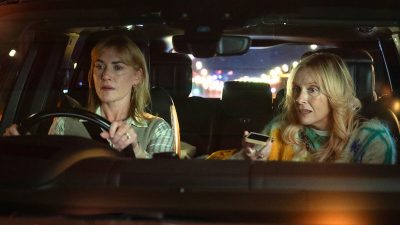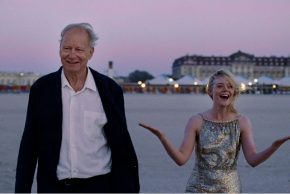She answers the phone and I’m astonished how beautiful her voice is. I can imagine her leading a meditation group or helping a cranky kid to fell asleep. Sometimes she tells me to stop her if she talks too much, but it’s simply not much at all: I simply love to listen to this voice and feel the fiery power and energy that comes through the invisible wires while she’s discussing her work. And it’s only her speech sound – how could her singing voice be? I talked to Olga Peretyatko, the world famous opera singer.
This is an impressing programme for a concert! From Mozart to Rachmaninov, almost two hundred years…
Originally, we only planned Mozart and bel canto, and Rachmaninov was part of the encore. Then somehow, it made its way to the program, and we didn’t change it anymore, at least it shows a nice diversity of music. At the end, I am also going to sing from Gounod’s Romeo and Juliet, and a few interesting encores (if the audience wants it). This is the first time for me to work with conductor Michelangelo Mazza. I have been to Budapest last year, although only for two hours, but I found it beautiful. I hope to see a bit more this time… But I have to take care of my voice, I need all the rehearsals and the concentration, who knows how much time do I have for sightseeing.
So the program… these are all highlights of operas. Lucia di Lammermoor, Anne Boleyn, Norma. In the second part, there are two arias of Verdi. This is a program full of my favourites, and it might be long, but I’m not the kind of performer who stands there, sings three pieces and an encore, and that was it. I’m honest to my audience, and do everything with 200%, in the best possible way. If you are that honest, then you get the same back from the audience that appreciate it.
Does this mean that you all played these in opera?
No, not all. Lucia is running nowadays in Vienna, but the others mostly come up at concerts. A lot of people ask when will Romeo and Juliet be in my repertoire, but oddly enough, this role has never been offered to me. Actually, I’m a huge fan of bel canto, but Juliet was always around as well. However, the opportunity never came. Or Sophie in the Rosenkavalier: I’ve also never got the chance to play that one. Soon I’m going to be too old for these roles! (laughs)
How do you mean it? Your voice, your stage presence, your technique?
It’s my voice that changes, not my technique. Of course, I always have to supervise my technique as well, and sometimes consciously modify things – this kind of control is always there. But yeah, our voice is part of our body, and as our body changes and ages, our voice needs to be examined over and over again. It’s very important and useful to have someone whom you trust completely, and who can take an external part in this controlling. Otherwise, I have no chance, unfortunately, to take a 3-month break and only do singing exercises or attend some training. I have my obligations in theatres, and this is how it should be, so I always combine work and study.
My voice seems to be stronger with time, actually, even in the middle ranges. From next year on, I might go in this direction, to have queen roles. Anne Boleyn, appearing at this aria concert, is already one member from this list. And I will have more Mozart, Pamina, Donna Anna, Elettra and others. Mozart is good for the soul, too. I’m actually quite happy that now I can sing certain things that I couldn’t some years ago, because my voice still wasn’t capable of them.
Anyway, it is much easier than with 18 years. The older you get, the more music you have in yourself, and the more experience you gather. And all theatres want different things. There was a time in Monte Carlo when I was supposed to sing all roles is Les Contes d’Hoffmann. Then the same opera in Baden-Baden with another group of musicians and director had a completely different conception and different edition with extra arias and ensembles I’ve never heard before. I always have to do new things, but it’s absolutely worth it. This opera is such a fun, not only for the audience but for ourselves. The arias are written with a genial sense of dramaturgy; they speak about loyalty, love, eternal questions, spoken through the language of music. Marvellous!
It seems to be a much more complicated job than it might look like on the surface.
It is very complicated, indeed. There was a time when it was enough for an opera singer just to stand and sing, but directors of today expect much more. Apart from our acting skills, sometimes we are even in need of our athletic skills, and also sing throughout 4-5 hours.
Are you afraid of critics?
No, professional critics are fantastic and can be very useful. But you can believe me that we, musicians, are the strictest critics of ourselves. And that is life anyway, some people hate you, some love you.
Still, do you have harder moments when you feel you are fed up with your whole profession?
Sometimes it is a bit hard to face the fact that people only see the end result in our case, sparkling on a stage, flowers and signings. Nobody is aware of the invisible work, problems, and sacrifices. They don’t see me sitting in a hotel room all alone, they don’t see me never being at home, not being able a normal family life. This is complicated. But music is powerful. And I chose this profession, although it is also true that the more famous you are, the harder is to deal with pressure. Not everyone is able to do this job, but this was how I wanted to live my life, and I never ever regretted it. I always want to give my best.
True, sometimes a bit more rest, a bit more calmness would be great. I still don’t have children, maybe if I’ll have them someday, then it will be a different phase in my life. But until then, I keep travelling around the world. I’ve seen lots of cities, countries, I’ve met all kinds of people, who sometimes arrive from the other side of the world just to see my concert or opera. This is an enormous responsibility. I enjoy music, but I also accept all the emotional difficulties and all the time I try not to forget: it’s not about you in the music, it’s about music in yourself. Maybe the most touching moment was when people told me that my voice had a therapeutic effect on them. After such a feedback, it is easy to let all the negativity go. Some might hate me, but why should I care – this is indeed my voice, and music is not only entertaining.

























Comments